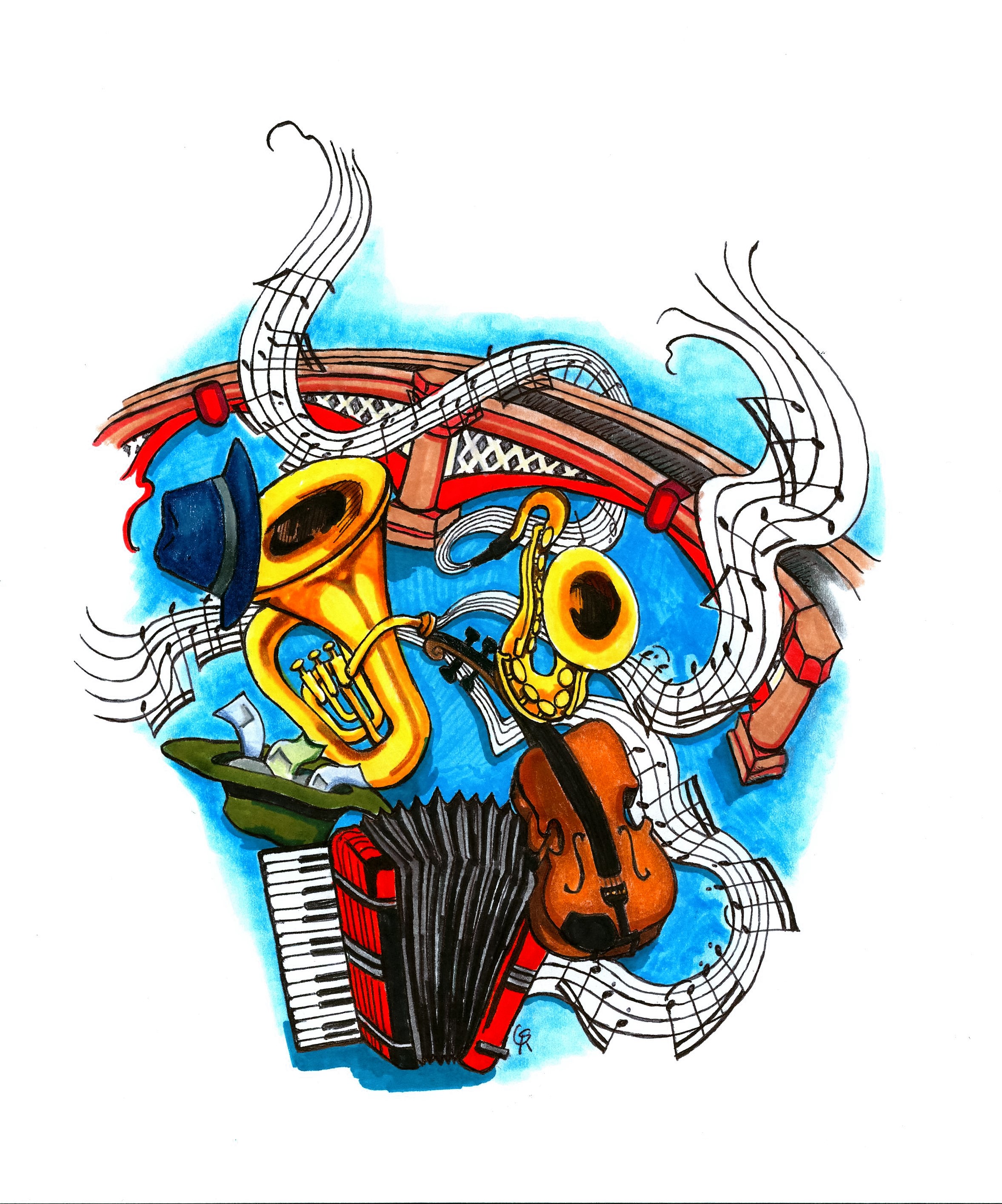
The flame-tooting tuba player has two top hats. He wears one, and the other sits in front of him and collects coins. I circle the block with my accordion on my back; I am searching for a place to play, but how can I compete?
“It’s all bouquets and brickbats, as they say,” says Steve Marshall, a saxophone player from Cornwall who plays under Blackfriars bridge in London. He likes there to be some natural resonance so the sound doesn’t get lost. When I ask how much he makes on a good day, he shrugs and says, “I don’t worry about it.” People stroll along the river. Most do not stop to listen. A couple sits on a ledge nearby. Perhaps they will throw a coin in the saxophone case, but most likely they will continue on their way.
Along Brick Lane, Deanna carries a can of beer in the early afternoon, yelling out expletives and asking for money. She sings to me and tells me, “Honey you’re so talented don’t you ever stop playing.” I try to tell her to stop throwing coins in my case, but she prances away, slurring, “I love you. Don’t worry about a thing.” Later, a woman with a fresh scar along her cheek asks me for a coin from my case, and promises to pay it back. I cannot refuse.
When I play, I am careful not to reveal who I am, why I am in London, or what I do during the week. It seems out of character to say that I attend an elite university, that I go to work every day at a big museum in South Kensington, or that I pay my rent with grant money. At work I never mention that I play an instrument. When I busk, I am part of the world of the street.
I have my own false promises as a street musician: the long list of the songs I’ve promised to learn for next week when people make requests. It includes Norwegian folk songs, the theme from The Third Man (supposedly it sounds better on the zither) and Bella ciao.
I play a rotation of six or seven songs, including The Godfather Waltz, Starman, that song that goes what is love baby don’t hurt me no more, some vaguely French ones that are actually Beirut covers and a song that a crocodile plays in a Russian cartoon. Most of them I taught myself when I was 15 and tired of the endless polkas my teacher assigned.
The summer I turned 16, I started busking at Eastern Market in Detroit, three minutes from my home. I played a few simple tunes with my younger sister on violin. In the fall, I went off to play with some friends from the market. We practiced in the back alley of a print shop and our singer took frequent breaks to roll cigarettes. He stopped showing up, and I started playing on my own. I have no amp. I do not sing. I like to sling my accordion on my back and go.
When I set out into the world of busking in London, I find I am most comfortable among the stalls of its street markets. My least favorite is Portobello Road, full of too-hurried tourists. On Sundays I alternate between Columbia Road Flower Market and Brick Lane. Broadway is filled with expensive vintage and artisan elderberry sorbet, but the marketgoers have tight pockets. I make more money at Hoxton, where toiletries and clothes are cheap and the children dance to my music.
Two hours at the market in Detroit would earn me $75. In London, I might make half that. Garance Louis, a French musician who lives in East London, says, “It’s gambling. You don’t know. You can make three pounds. I think the best is 200 pounds. You never know.” Garance also plays a red accordion, and in her I see a dream version of myself if only I knew more French chanson. In the winter, she travels. “It’s too depressing here. So I just go,” she says. She has played forró in Brazil, spent a month in New Orleans and has travelled throughout Europe. She says, “I feel I will carry on doing it until I’m 70. I feel I will never stop.”
She asks me if I’ve ever wanted to quit. I think of the relief I feel when I wake up to rain on a busking day. I’ve had to fend off creepy men who stood too close. I’ve had to walk on feet aching from playing all day to save £2.40 on tube rides. And then there is the self-doubt: That I am no good, that I am just an amateur.
I recently spent a week back at home in Detroit. That Saturday, I returned to the market. The little girl who played violin with her father by her side now calls herself The Urban Violinist. Pearl — the shoe repairman’s puppy — is no longer small. The paint-bucket drummers must have played later in the afternoon. But as I opened the bellows once again, I thought to myself: No, I will never stop.







